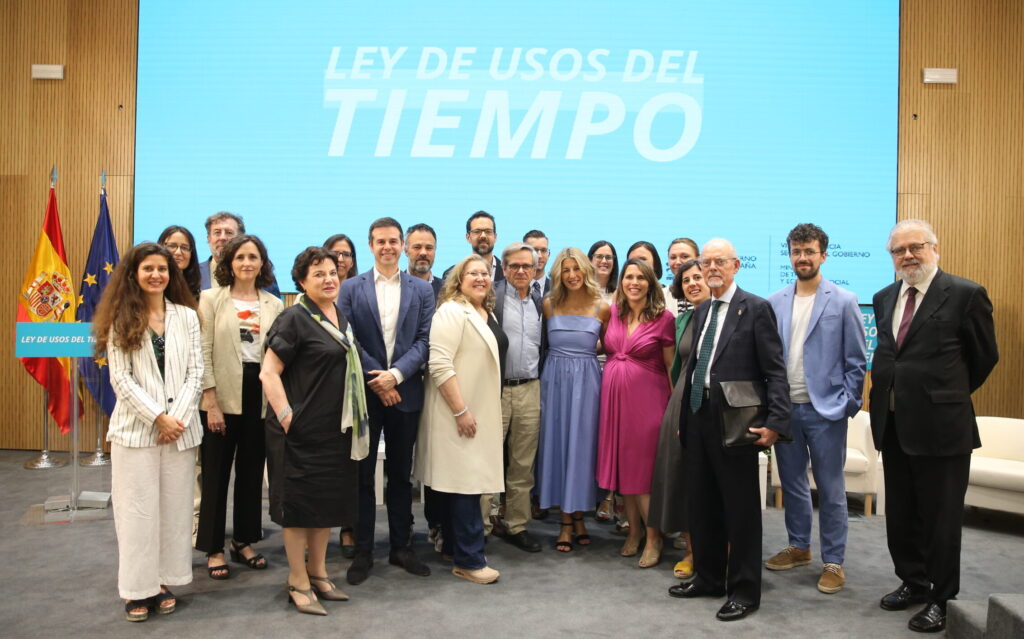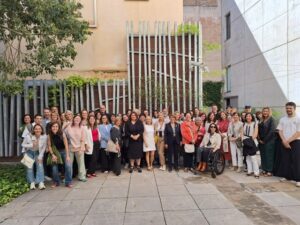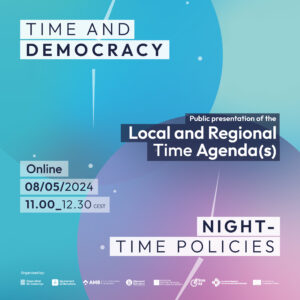Spain has a problem with schedules and its time use compared with Europe. Such an issue causes time poverty —not having time for oneself—, and negative impacts on health, efficiency, equality, and democratic and environmental sustainability.
Time is a political issue and the way it is organised determines the established social model, which needs to be adapted to structural changes due to the progress of society. The importance of regulating working time is historical. In 1919, the first International Labour Organisation (ILO) convention focused on regulating working time.
More than 100 years ago, Spain was the first nation in the world to legislate the maximum of 8-hours working day in all working sectors (1919). Since then, however, society and the labour world have been profoundly changed, and time unrest is once again a concern for a majority of citizens. Spain can now be the first country to make a Time Use and Schedules Rationalisation Law in the 21st century.
The Time Use Initiative (TUI), the organisation that coordinated the Base Study, explains that the future law should have a holistic approach. In other words, not only should it regulate the basis for a balanced working time organisation (through collective bargaining); it also needs to approach to time use comprehensively by analysing how prime time, school schedules, and shopping hours are organised.
According to Marta Junqué, Coordinator of the Base Study and the TUI, “We need a new social agreement; a Time Use Law that addresses, holistically and thoroughly, the bases for a balanced time organisation, as recommended by the ILO and the European Social Charter. We need a new time organisation that contributes directly to improving worker’s health, equality, work-life balance, social co-responsibility, sustainability, productivity, and companies’ and organisations’ efficiency.” In this regard, the study envisages 100 measures to ensure a balanced time organisation.
Among the labour measures, highlights are:
In order to achieve the organisation of a balanced working time, it does not imply to only rationalise and reduce it —there are other equally essential objectives.
- In the first place, a rationalisation of the working time. Spain is the country in which workers finish their working time the latest. 30% of them work until 7 pm, and 10% continues working until 9 pm. Therefore, a first aim has to be the rationalisation of working time.
- Measure: Specifically, a gradual reduction of the maximum working week in order to reach 37.5 hours in 2026 and the 32 weekly hours in 2032. The reduction of the working day would allow to align Spanish labour regulation with the already-existing tendency in other countries and companies — reducing the working day, already in place in civil servants’ contracts and in many collective agreements.
- Measure: the compaction of the working. In particular, we propose to establish a single interruption to the working hours, with a maximum duration of 1 hour, unless if the collective agreement extends it. Limiting interruptions in the working day is especially important in part-time contracts; they are highly feminized and often unintentional, as many people working part-time do so because they do not find full-time jobs or because of conciliation needs. It is therefore essential to ensure that part-time work is not overstretched by multiple interruptions.
- In this regard, and secondly, it is necessary to achieve a healthier and safer organisation of working time. At this point, we must bear in mind that stress accounts for 30% of work leave, and 60% of workers claim to have stress at work. Therefore, people’s safety and health is another essential objective in the organisation of working time.
- Measure: reform of the regulation of shift work and night work. The scientific evidence tells us that people who work in shifts or at night are at greater risk of suffering from health problems arising from work. We therefore propose to review this regulation. For example, we propose that people working on rotation shifts should not be able to work more than five consecutive nights. Or to introduce a right to changing shift for 50-year-old or more people, so they can move from a night shift to an available day shift in the company for which they have the necessary professional qualifications.
- The third objective is to ensure greater transparency and predictability in the organisation of working time. There are people who have completely variable and totally uncertain timetables. Not only do they not have the flexibility or autonomy to manage their working time, but, furthermore, they have no certainties about what their working time will be. And this certainly contributes to a greater time poverty.
- Measure: strengthening the company’s obligation to inform workers about all aspects relating to working time, such as the duration of the working day, the timetable, or the overtime regulation appliable in the company.
- The fourth objective we consider is flexibility in the organisation of working time. It is important to increase people’s autonomy in the management of working time, which contributes to increasing worker’s satisfaction and also promotes company productivity.
- Measure: To opt for greater flexibility in the organisation of working time (i.e. system of accumulated hours).
- The fifth objective is to achieve an equal and co-responsible working time. The current organisation of working time certainly makes it difficult and, in some cases, even impossible to balance family and personal life. Many people, mostly women, are forced to reduce their working hours or even give up their careers in order to balance their family and work responsibilities.
- Measure: to extend the options for reducing the working day, allowing, for example, a reduction in working hours to be discontinuous throughout the week, month or year, or to allow a reduction in working hours for people living in the same house, even if there is no kinship relationship. We also propose extending the paid permits and including, for example, a paid permit to attend medical visits by children and relatives.
- Finally, the sixth objective is to encourage greater participation in the organisation of working time within the company.
- Measure: companies of 50 or more workers should draw up and implement an Improvement Plan for the Organisation of Working Time and Time Use. The objective is that the Plan, negotiated between the company and the workers’ legal representative, should include a diagnosis of the situation in the company. Measures necessary to move towards more balanced timetables should be taken accordingly.
Among the most transversal measures, the following are to:
- Promote more rational timetables in the audiovisual sector. This is an historic but very important demand in health and rest sectors, and very significant for increasing citizens’ awareness. With regard to countries around Spain, television prime time starts 2 hours later, which delays our sleep time and the number of sleep hours.
- Measure: Deployment of a National Agreement to advance prime time and the promotion of responsible audiovisual time programming that takes into account the most vulnerable audience, especially children and teenagers.
- Advance retail closing times. Spain is one of the countries where retail usually closes later (30% of workers are still working at 7 pm). In most European countries, retail closing time is around 5 pm.
- Measure: Compact retail’s midday break and close before 7 pm.
- Another key pillar for the organisation of time is school hours: healthier, more balanced educational hours. Spain has more teaching hours than average compared to the EU and the OECD, although academic performance is below the average, and students demand more time off and spending more time with their families.
- Measurement: Adapt school schedules and training centres to circadian rhythms, beginning classes later for teenagers and young undergraduates, and follow the “open centres” model of Portugal and Germany, without increasing teaching hours but increasing the after-school hours.
- Increase citizen and social and productive fabric participation in the day-to-day schedules of their municipality. This is a measure that European cities have been applying for several decades to improve their timetables and services (e.g. to encourage entry into the city during the rush hour).
- Measure: Establish compulsory Plans for Organising Time in the Municipality of the Municipality for municipalities larger than 50,000 inhabitants.
- Finally, the Public Administration should set an example and promote these more rational schedules both internally, humanising schedules especially of senior officials (e.g. plenary and press conferences, and public events), as well as externally, promoting measures to:
- Establish incentive measures for companies and organisations for this cultural and organisational change (economic, fiscal, or social recognition stimulus).
- Create a Social Negotiation Table for the Uses of Time and Time Rationalization in Spain with the most representative social agents.
- Define awareness campaigns towards citizens, for more balanced and healthy weather uses.
The Time Law should be one of the main measures to be approved in the upcoming parliamentary term
The Spanish Government Plan for the 2019-2023 term was to approve a Time Use and Schedules Rationalisation Law. For this reason, the Ministry for Labour and Social Economy requested a Base Study that supported such a Law. It was coordinated by the TUI (the main global initiative promoting the right to time) and counted with the collaboration of more than 60 experts, as well as consultations with the main trade unions and employer’s organisations.
The early elections did not facilitate the parliamentary procedure and the necessary social dialogue that involved the Law. On this subject, Junqué highlighted that “We welcome the presentation of the conclusions of the Base Study, and we hope that they will be used as the basis for the Time Use Law in the next parliamentary term — an objective that all political parties should take in their electoral programme.”
The presentation was attended by the second Vice-President of the Spanish Government and Minister fot Labour and Social Economy, Mrs Yolanda Díaz; members of the Studio’s drafting team, such as Marta Junqué, Ignacio Buqueras, Dr Maria Amparo Ballester, Dr Anna Ginés and Dr Gonzalo Pin; as well as video interventions by the ILO and the Local and Regional Governments Time Network.









